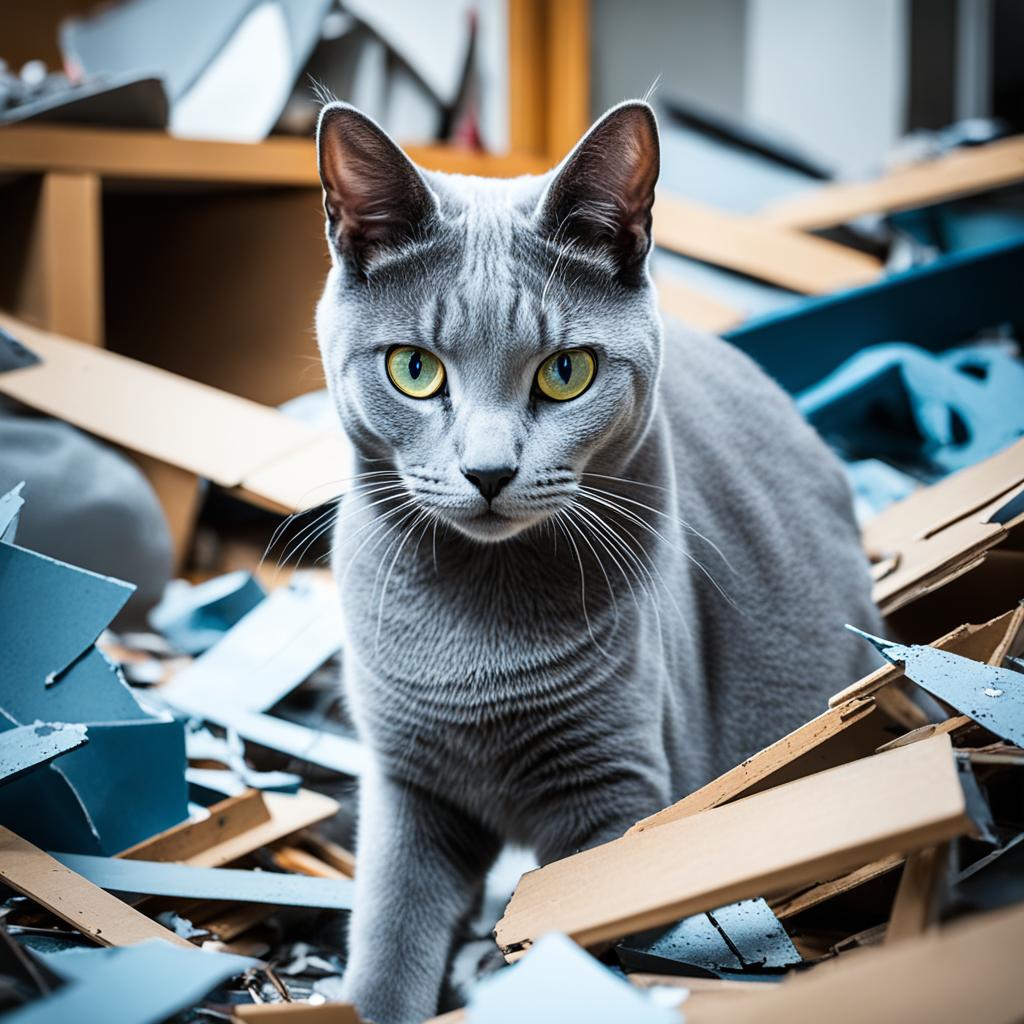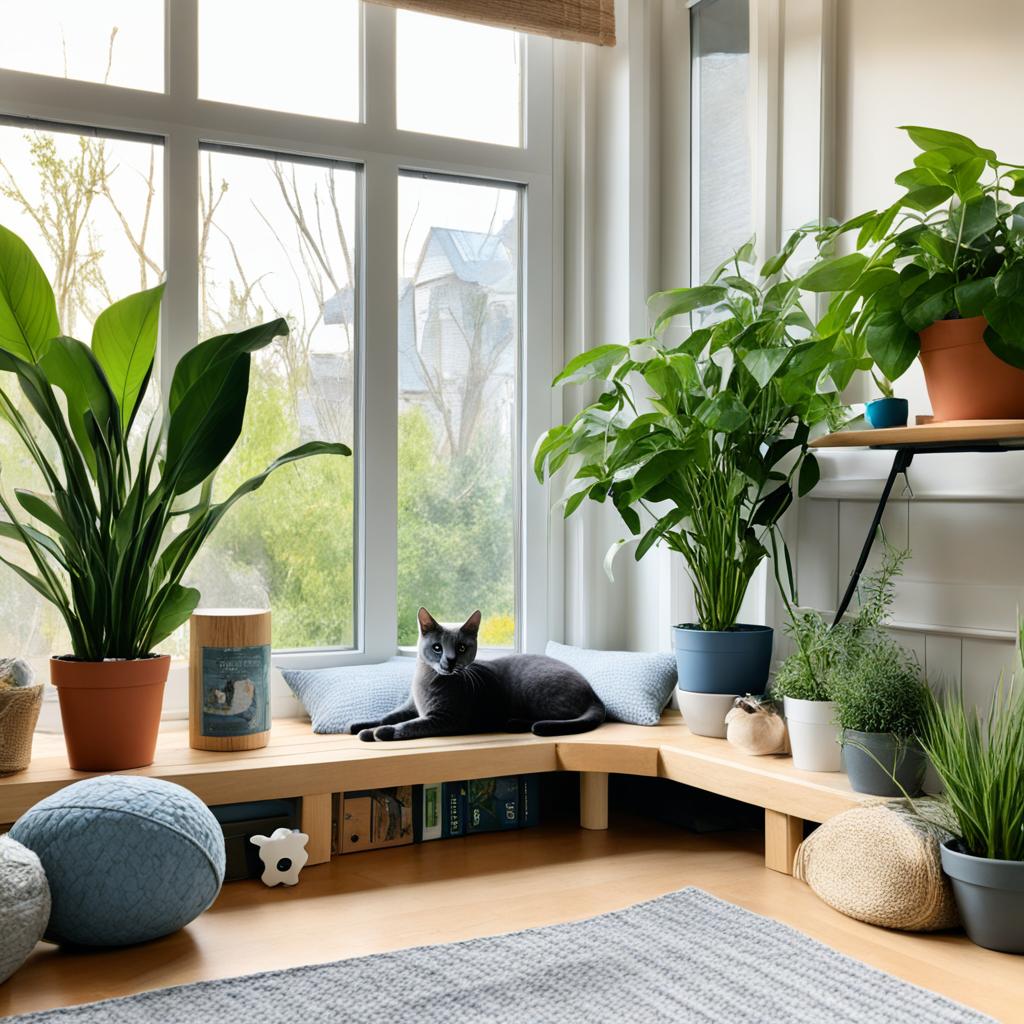Ever wonder why your Russian Blue cat, usually so calm, acts strangely? Things like sprays, growls, and seems uneasy? Many Russian Blue owners face these issues. Let’s see what makes these lovely cats go a little wild.
Russian Blue cats often spray and feel uneasy, especially in shared spaces with many cats and people. A Russian Blue called Urraco showed distress by growling and spraying. This could happen due to not having enough space or tension with other cats. If not dealt with, these problems can lower everyone’s quality of life. So, let’s figure out what’s wrong and how to make it right for everyone involved.
Key Takeaways
- Russian Blue cats often display spraying behavior and uneasiness in shared environments.
- Conflicts within a mixed cat population can lead to behavioral problems.
- Addressing these issues promptly is crucial for enhancing the quality of life for both the cat and the owner.
- Discomfort due to lack of solitary space can trigger dissatisfaction in Russian Blue cats.
- Understanding and addressing their behavioral issues helps in creating a harmonious living environment.
Understanding Your Russian Blue’s Behavioral Traits

Russian Blue cat owners know how important it is to understand their cats. These cats are known for their green eyes and beautiful blue coat. Yet, they also have behaviours that make them stand out.
Nature and Intelligence
Russian Blue cats are very smart and curious. They come from Arkhangelsk, Russia. Before doing anything, they carefully observe the situation. This might make them seem distant, but it’s just their way of being careful. They are very good at learning new things and solving problems. This shows how smart they are.
Playfulness vs. Aloofness
Some people think Russian Blue cats are cold, but they are actually playful. They like games and toys that make them think. Playing fetch and opening doors are fun for them. While they might be shy around new people, they show their fun and loving side at home. They strike a good balance between being smart and being fun friends.
Russian Blue Cat Aggression

Dealing with a Russian Blue cat’s aggression can be tough. But, if you understand what’s causing it, you can keep a good relationship. It’s key to know why your cat might be acting this way.
Root Causes of Aggression
Russian Blue cats might get aggressive for a few reasons. They like to mark their own territory, which can be challenging if they have other cats around. They also prefer calm and order. Changes or chaos at home can make them act out.
Managing Aggressive Behavior
To help your cat be less aggressive, create a peaceful place for them. Give them their space and keep their area calm. Play with them often and use toys to keep them busy.
If the aggression continues, get advice from a vet or a pet behavior expert. They can offer more tips and help you find a solution.
Dealing with Russian Blue Cat Anxiety

Russian Blue cats are known for their striking looks and their sensitivity to change. This can cause them to feel anxious. Big changes in their home, like new schedules or family members, can stress them out.
These beautiful felines need a steady routine to feel safe. They like to eat at the same time daily and don’t handle changes well. Signs of their anxiety might include hiding or being cranky. Building a steady, calm environment is crucial for their mental health.
To help your cat feel less stressed, keep their mealtimes consistent. Make a quiet space in your home where they can go to relax. Following a routine and decreasing surprises can calm your Russian Blue.
Playing regularly with your cat can also lower their anxiety. This activity distracts them from what makes them anxious and strengthens your bond. These simple actions can greatly improve your cat’s mood and health.
What Are the Common Behavioral Issues in Russian Blue Cats?

Dealing with *Russian Blue cat behavioral issues* can be quite the adventure. One common issue is cat territorial spraying. This happens when your Russian Blue has to share space with other cats.
Cats can get stressed living together. This stress can lead to them marking their territory all over your home.
Spraying and Marking Territory
Ever wondered why your home smells like your cat’s perfume? Russian Blues spray to show they’re not happy or feel stressed. When they feel their territory is threatened, they spray. It’s their way of saying, “Back off, this is mine!”
Signs and Symptoms
Spotting *Russian Blue cat behavioral issues* isn’t hard. One sign is finding pee in places they shouldn’t, like your bed. They do this to show they’re the boss.
“If your Russian Blue is doing art with their urine, solving the main issue is key,” says cat behavior expert, Jackson Galaxy.
Solutions and Remedies
There are ways to handle *cat territorial spraying*. Start by making a calm space for your cat. Pheromone sprays can also help relax them. It’s important they feel like they have their own spot in your home.
If the spraying continues, see a vet. They might suggest behavioral therapy for severe cases.
| Solution | Effectiveness |
|---|---|
| Pheromone Sprays | High |
| Creating Secure Spaces | Medium |
| Behavioral Therapy | High |
So, finding cat pee isn’t fun, but it’s a part of learning about *Russian Blue cat behavioral issues*. It shows how unique and interesting our furry friends can be.
Handling Russian Blue Cat Spraying

Dealing with Russian Blue cat spraying can be tricky. But, there are ways to reduce or stop this behavior. Neutering your cat is one big step. This helps cut down on the urge to mark territory.
Keeping your home clean and cozy is important. Make sure the litter boxes are clean and easy for your cat to reach. You can also add things like new toys or places to climb. This can help keep your cat busy and not interested in marking.
Using pheromone sprays is a smart idea too. These sprays create a calming effect for your cat. They feel more at ease and are less likely to spray.
A table below shows key methods for dealing with cat spraying:
| Approach | Description |
|---|---|
| Neutering | Reduces hormonal drive causing marking behavior. |
| Clean Environment | Maintain regularly cleaned and easily accessible litter boxes. |
| Environmental Distractions | Introduce new toys and climbing structures to divert attention. |
| Pheromone Sprays | Create a calming atmosphere to make the cat feel secure. |
Why Is My Russian Blue Cat Hiding?

Your Russian Blue might be hiding due to environmental stressors or health issues. These things could be making them feel fearful and stressed.
Environmental Factors
One big reason for your cat’s hiding could be the environment. Things like other pets, new people, or big changes in their space may scare them. Russian Blue cats like their peace and quiet. So, these changes might make them hide more.
It’s important to give them a calm space where they can go. A place they feel safe in.
Health Issues
Lingering hiding could mean your cat’s not well. Health issues like stress diseases or severe illnesses could be at play. A trip to the vet for a check-up is vital in these cases. Catching and treating such issues early can greatly help your cat.
Russian Blue Cat Separation Anxiety

Many Russian Blue cat owners face separation anxiety issues. Learning the signs early and acting can really help your cat. Effective strategies can boost your cat’s happiness.
Identifying Separation Anxiety
Watching for signs of Russian Blue cat separation anxiety is crucial. If your cat meows a lot, destroys things, or grooms too much, it might be anxious. Usually calm and independent, they may become very worried when you’re not around.
Coping Strategies
There are several ways to help a cat with separation anxiety. You can add fun activities to their day, like interactive toys. Also, sticking to a routine and having cozy places for them can calm their nerves.
“The key to managing pet anxiety lies in a predictable and enriching environment for your cat.”
Here’s a table to spot separation anxiety from normal cat behaviors.
| Behavior | Separation Anxiety Indicators | Other Behaviors |
|---|---|---|
| Vocalization | Excessive Meowing | Normal Communication |
| Destruction | Chewing or Scratching Furniture | Playful Scratching |
| Hiding | Hiding When Alone | Hiding Due to Environmental Stressors |
Dealing with Russian Blue cat separation anxiety is key to their mental well-being. Expert advice and paying close attention are crucial in managing pet anxiety.
Interacting with Other Pets

Bringing a Russian Blue into a multi-pet household has its challenges. These cats often prefer humans or their own kind. But with the right steps, you can make Russian Blue interactions with other pets successful.
It’s important to start introductions slowly and calmly. Make sure all first meetings are supervised. This helps all pets feel safe and not get too stressed.
Remember, patience is key in a multi-pet household. It might take time for everyone to get along well. Keep activities positive and relaxed.
Keeping an eye on the pets is crucial. Look for any signs that they’re not getting along. If you see any, step in and guide them to better behavior.
Focus on what your Russian Blue is saying with its body. Cats are good at showing how they feel without speaking.
Here’s a simple guide to help you through this:
- Begin by swapping scents of the pets.
- Use baby gates for safe first looks.
- Reward good behavior with treats and praise.
- Make sure each pet has its personal quiet space.
- Slowly make their time together longer as they get comfortable.
Let’s compare how Russian Blues react to various pets:
| Type of Pet | Typical Russian Blue Reaction | Tips for Positive Interaction |
|---|---|---|
| Other Cats | They tend to keep to themselves. | Start slow and respect their personal space. |
| Dogs | They’re cautious but interested. | Patience and using treats can build friendships. |
| Small Animals | They’re very curious about them. | Start by keeping them apart and slowly let them meet. |
Though introducing pets carefully may seem hard, it pays off. Following these steps lead to a happy home for all. It will make Russian Blue interactions in your house calm and enjoyable.
Creating a Stress-Free Environment

Making a stress-free home for Russian Blues means thinking carefully about their needs. By setting up their space just right and sticking to a routine, you can really boost their happiness.
Environmental Enrichment
To keep Russian Blues happy, it’s crucial to improve their surroundings. This includes adding special tools and spaces that awaken their natural instincts and ward off boredom. Recommended enrichment ideas are:
- Secure climbing structures
- Interactive toys
- Peaceful observation spots like window perches
It’s important to let cats act naturally in a safe way. Top brands like Kong and Trixie design products that meet these needs. This helps cats live stress-free.
Maintaining Routine
Consistent daily habits are comforting, especially for Russian Blues. A steady routine is vital for their mental well-being. This includes:
- Regular feeding times
- Predictable human interactions
- Clean, organized habitat
Keeping things in their place at home helps your cat feel secure. It makes finding their essentials easy, which calms them. Regular play also makes them feel part of the family.
| Enrichment Method | Benefit |
|---|---|
| Climbing Structures | Improves physical activity and provides a sense of security |
| Interactive Toys | Enhances mental stimulation and prevents boredom |
| Observation Spots | Allows peaceful monitoring of the surroundings |
| Regular Routine | Promotes predictability and reduces anxiety |
Conclusion
Improving your Russian Blue cat’s life comes from knowing their needs. These smart cats have unique blue fur. They need a mix of regular routines and things to make them think.
Solving any bad habits, like being too rough or anxious, makes life better. It also makes you two closer. To help your cat, make sure they feel safe and have fun things to do. This means good toys and spots for them to climb.
Working to make your Russian Blue happy is worth it. It leads to a better home for both of you. If you care for them well and make their home stress-free, you’ll have a great friendship. The effort you put in to understand and care for these beautiful cats really counts.
FAQ
What are the common behavioral issues in Russian Blue cats?
Russian Blue cats might spray, act aggressively, or hide. These actions are usually because of fights over territory or feeling stressed by change.
How does the intelligence of Russian Blue cats influence their behavior?
These cats think carefully before they act. Their smarts might lead to fun tricks, like opening doors. But if they get bored, they may start trouble.
Why does my Russian Blue cat sometimes appear aloof?
They’re not really ignoring you; they’re just careful. Russian Blues like to check things out before getting involved, giving them a cool vibe.
What can cause aggression in Russian Blue cats?
Aggression might come from fights over territory or if their daily life changes too much. It’s seen more in homes with multiple cats.
How can I manage aggressive behavior in my Russian Blue cat?
Keep your cat’s home calm and steady to reduce aggression. Make sure they have their own space and keep routines the same.
How can anxiety manifest in Russian Blue cats?
They might hide, get irritable, or act differently if they’re stressed. Changes in routine or environment can trigger these behaviors.
In multi-cat homes, marking territory is a common issue. It shows up during fights over space or when they’re very stressed.
What are the signs and symptoms of spraying behavior in Russian Blue cats?
They might pee in certain areas, not in their litter box. This shows they might be nervous about their territory.
What remedies can help reduce spraying behavior in Russian Blue cats?
Neutering, keeping a tidy home, and adding fun things for your cat to do can all help. If it keeps happening, a vet can give more advice.
How do I handle spraying behavior in my Russian Blue cat?
Neutering and keeping the litter box clean are a start. Adding new toys can keep your cat busy. This helps reduce marking.
Why might my Russian Blue cat be hiding more than usual?
She might be hiding because of new people or pets at home. Or, it could be a sign of being unwell, so a vet check is wise.
What environmental factors can cause my Russian Blue to hide?
Having many pets, strange visitors, or too much noise can lead to hiding. Your cat might choose to be alone to feel safe.
What health issues could cause my Russian Blue cat to hide?
Stress-related illnesses or hidden health problems might cause her to hide. A vet can make sure she’s okay.
What are the signs of separation anxiety in Russian Blue cats?
Look out for a lot of meowing, bad behavior, or her being very upset when you’re not around.
How can I help my Russian Blue cat cope with separation anxiety?
Toys that make her think, a cozy home, and the same routine every day can make being alone easier for her.
How do Russian Blue cats interact with other pets?
They can make friends with other pets. Introduce them slowly and watch how they get along to make sure it’s good.
How can I create a stress-free environment for my Russian Blue cat?
Things like climbing posts and toys help. Stick to a regular schedule for meals and play. This makes your cat’s world safe and happy.




